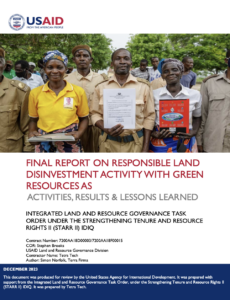 This report describes the implementation of activities to improve tenure security and resource ownership of communities potentially affected by the divestment of land areas by a forestry company that was undertaking a restructuring and consolidation process in respect to its landholdings in the north of Mozambique. Green Resources AS (GRAS) is a private Norwegian company founded in 1995 (under the name Fjordgløtt, subsequently renamed Tree Farms, and now known as Green Resources) by Mads Asprem, who is a leading entrepreneur and consultant in sustainable forest plantations and paper industries. It is focused on forest development and wood processing in East Africa and manages operations across Mozambique, Tanzania, and Uganda. It is the largest tree plantation company in Africa,1 excluding South Africa. GRAS notes that its mission “is to establish East Africa’s leading Forest Industry Company working for the benefit of its shareholders, employees and the communities where it operates.”
This report describes the implementation of activities to improve tenure security and resource ownership of communities potentially affected by the divestment of land areas by a forestry company that was undertaking a restructuring and consolidation process in respect to its landholdings in the north of Mozambique. Green Resources AS (GRAS) is a private Norwegian company founded in 1995 (under the name Fjordgløtt, subsequently renamed Tree Farms, and now known as Green Resources) by Mads Asprem, who is a leading entrepreneur and consultant in sustainable forest plantations and paper industries. It is focused on forest development and wood processing in East Africa and manages operations across Mozambique, Tanzania, and Uganda. It is the largest tree plantation company in Africa,1 excluding South Africa. GRAS notes that its mission “is to establish East Africa’s leading Forest Industry Company working for the benefit of its shareholders, employees and the communities where it operates.”
In late 2018, GRAS in Mozambique initiated a corporate restructuring process, partly prompted by the realization that it did not have the capacity to develop all the land area that it had acquired, and partly by concerns related to risks raised by investors. At that time, the company landholding totaled an estimated 360,000 hectares (ha), but very little of this had been developed or planted. Many of the holdings had been acquired through the purchase of several pre-existing plantation forestry companies; these were often relatively small blocks, many of whichˇ had no standing timber or company infrastructure and were scattered across vast areas of the provinces of Nampula, Niassa and Zambezia. The restructuring process was therefore to be accompanied by a large-scale disinvestment from underutilized landholdings, in which the group wished to relinquish its exclusive land use rights that had been concessioned to it by the government. This would allow local communities, who have farmed these lands for generations under good faith occupancy, to register their land use rights over these areas. This created an opportunity for USAID, via the Integrated Land and Resource Governance (ILRG) program, to test and document best practice methodologies for a community rights-based, inclusive, gender-responsive and participatory responsible land divestment process. It aimed to help communities understand their rights vis-à-vis the private sector forest concessions and to support communities to establish local land governance entities to document, manage and administer their land rights, including future potential sustainable business ventures linked to timber resources.ˇ

